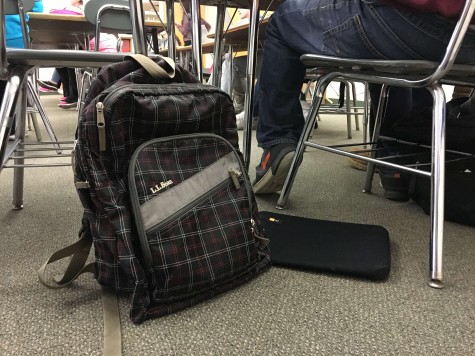Ipswich High Backtracks on Backpacks
March 31, 2016
 Ask any Ipswich High School student what they think about the school’s (now former) backpack policy, and you’re likely to get a very passionate answer. Emotions run strong when discussing this issue because it hits home for a large portion of the student population. But more recently, the policy became the center of a public debate — ending with a full reversal of the rule on a school-wide level.
Ask any Ipswich High School student what they think about the school’s (now former) backpack policy, and you’re likely to get a very passionate answer. Emotions run strong when discussing this issue because it hits home for a large portion of the student population. But more recently, the policy became the center of a public debate — ending with a full reversal of the rule on a school-wide level.
Let’s take a step back and look at the origins of this issue. Ever since the implementation of the backpack ban over a decade ago, students have largely ignored it and teachers have largely been indifferent about enforcing it. This was the situation up until about mid-February, when the central office decided to start more strictly enforcing the policy. Teachers were told to keep an eye out for offenders and to send those who were carrying their backpacks to their lockers to drop them off.
This did not sit well with students. Very soon after the crackdown began, a student-led petition began to circulate around the school with the goal of changing the policy. Hundreds of signatures were collected and submitted to the school administration for review. This greased the wheels for the policy change.
Ipswich High School Vice Principal Jeffery Carovillano explained that after the crackdown, “We had a lot of teachers coming down and saying that they didn’t think it was a good rule.” He further expressed that some students had backpacks for medical reasons and how it’s tough to differentiate between those who had it for a legitimate need and those who didn’t. “When you have a rule that you can’t enforce, that’s not really a good thing,” he said. Between the voices of students, teachers, and parents speaking out against the policy, Mr. Carovillano said, “The timing just seemed right to change it.”
The rule was originally imposed for several reasons. Security was a major impetus. There had been issues in other schools involving alcohol, drugs, and weapons being brought into school buildings in backpacks. Safety was another. Teachers had complained at the time that backpacks created tripping hazards on classroom floors and created a risk for injury. It’s also important to mention that students carrying their books around in backpacks just wasn’t a standard practice back then like it is now. These reasons created a “perfect storm,” in Mr. Carovillano’s words, for the now infamous backpack ban.
To Mr. Carovillano, who says he has always been in support of repealing the rule, this was a natural evolution in policy: “I think it’s healthy for us to re-examine rules in a regular way because times change.” He says he is happy for the rule amendment; however he would like to remind students that the policy is still in trial and that in classrooms, backpacks should be stored under chairs.
The no backpack policy reversal is seen as welcome by most of the student population. Students are happy that they get to carry their belongings in backpacks, and teachers are happy that they no longer have to enforce an unpopular rule. This whole saga goes to show that when students work with the school to change a policy we don’t like, we can make real, positive change.

Kris Desmond • Apr 11, 2016 at 2:10 pm
I think this article is a very good way to inform kids. This article posses a good point, the rule can always be changed back, so kids should conform to the rule and keep their bag under there seats.